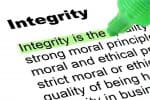In a recent article about “Building Rapport,” evidently this was an area in which many had an interest. As a result, our readership was well above average. This is a follow-up to that article and we hope that you will merely consider it as you represent BECCA products and the industry as a whole!
Integrity, for those who are not familiar, is quite important. It is the quality of being honest and having strong moral principles.
 Many have the conception that within the field of sales integrity is a lost trait. That said, many believe that the salesperson will say and do just about anything to make the sale. Key ingredients to regaining integrity are time and consistency. So, reestablishing integrity only occurs upon the person on the other side allowing trust to be restored. Integrity cannot be taken only given away. Unfortunately, it is rare to find people with a strong sense of integrity. However, some people exist who will not allow their integrity to be compromised.
Many have the conception that within the field of sales integrity is a lost trait. That said, many believe that the salesperson will say and do just about anything to make the sale. Key ingredients to regaining integrity are time and consistency. So, reestablishing integrity only occurs upon the person on the other side allowing trust to be restored. Integrity cannot be taken only given away. Unfortunately, it is rare to find people with a strong sense of integrity. However, some people exist who will not allow their integrity to be compromised.
“It not just being honest, it’s being consistent in everything you say and do.”
There are many thoughts as to why some salespeople are more successful than others. Maybe it’s a sales technique, or maybe it’s pure talent. However, when speaking to the one on the other side of the sale the most important quality in the success of the sale is personal integrity. People most often express that they want to do business with someone they trust.
Integrity and honesty are not the same things. The definition of Integrity: all the elements of your personality integrate into a consistent whole.
Here are a few things to consider:
1. What are your basic values about people and life?
If you have a positive view of people and see life in optimistic terms, as a result, people to whom you sell will be drawn to you. Thus customers will be more likely to trust you. People that are cynical and suspicious, have those values that will be echoed back and your customer will resist trusting you.
2. What are your general feelings about the act of selling?
If you think that selling means helping people and making them happier, healthier, and more successful, you’ll approach each opportunity with energy and enthusiasm. If you think selling means manipulating people into buying things they don’t really need, you’ll feel, in your heart of hearts, that you’re a louse and will eventually self-sabotage.
3. How do you assess your own sales ability?
If you’re confident in your ability to address customer concerns, understand their business issues, and create a solution that works for their unique situation, that confidence will make you more effective. If you’re not sure that you’re all that good at selling, your lack of confidence will make customers doubt your competence.
4. What is your level of commitment to taking action?
If you are absolutely committed to doing whatever it takes (within legal and ethical bounds) to help the customer, you will take timely action to make certain that the sale moves forward. If you’re not really committed, your actions will be half-hearted and ineffective and customers will respond by buying elsewhere.
5. Do you believe in the product or service you’re selling?
If you are certain that what you’re selling is the best available, that pride will reverberate through every action you take. If you secretly suspect that what you’re selling is substandard, your desire to help the customer will conflict with the knowledge that you’re selling them rubbish, thereby making you less effective.
Something to consider, if you intend to be really, really good at selling then…
- Be optimistic about people and life.
- Think of selling as a way to help people.
- Learn how to sell and keep learning more.
- Be 100% committed to helping the customer.
- Sell only what truly best for your customers.



